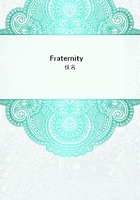
第45章
Hilary sat long in the sun, watching the pale bright waters and many well-bred ducks circling about the shrubs, searching with their round, bright eyes for worms. Between the bench where he was sitting and the spiked iron railings people passed continually--men, women, children of all kinds. Every now and then a duck would stop and cast her knowing glance at these creatures, as though comparing the condition of their forms and plumage with her own. 'If I had had the breeding of you,' she seemed to say, 'I could have made a better fist of it than that. A worse-looking lot of ducks, take you all round.
I never wish to see!' And with a quick but heavy movement of her shoulders, she would turn away and join her fellows.
Hilary, however, got small distraction from the ducks. The situation gradually developing was something of a dilemma to a man better acquainted with ideas than facts, with the trimming of words than with the shaping of events. He turned a queer, perplexed, almost quizzical eye on it. Stephen had irritated him profoundly. He had such a way of pettifying things! Yet, in truth, the affair would seem ridiculous enough to an ordinary observer. What would a man of sound common sense, like Mr. Purcey, think of it? Why not, as Stephen had suggested, drop it? Here, however, Hilary approached the marshy ground of feeling.
To give up befriending a helpless girl the moment he found himself personally menaced was exceedingly distasteful. But would she be friendless? Were there not, in Stephen's words, a hundred things he did not know about her? Had she not other resources? Had she not a story? But here, too, he was hampered by his delicacy: one did not pry into the private lives of others!
The matter, too, was hopelessly complicated by the domestic troubles of the Hughs family. No conscientious man--and whatever Hilary lacked, no one ever accused him of a lack of conscience--could put aside that aspect of the case.
Wandering among these reflections were his thoughts about Bianca.
She was his wife. However he might feel towards her now, whatever their relations, he must not put her in a false position. Far from wishing to hurt her, he desired to preserve her, and everyone, from trouble and annoyance. He had told Stephen that his interest in the girl was purely protective. But since the night when, leaning out into the moonlight, he heard the waggons coming in to Covent Garden Market, a strange feeling had possessed him--the sensation of a man who lies, with a touch of fever on him, listening to the thrum of distant music--sensuous, not unpleasurable.
Those who saw him sitting there so quietly, with his face resting on his hand, imagined, no doubt, that he was wrestling with some deep, abstract proposition, some great thought to be given to mankind; for there was that about Hilary which forced everyone to connect him instantly with the humaner arts.
The sun began to leave the long pale waters.
A nursemaid and two children came and sat down beside him. Then it was that, underneath his seat, Miranda found what she had been looking for all her life. It had no smell, made no movement, was pale-grey in colour, like herself. It had no hair that she could find; its tail was like her own; it took no liberties, was silent, had no passions, committed her to nothing. Standing a few inches from its head, closer than she had ever been of her free will to any dog, she smelt its smellessness with a long, delicious snuffling, wrinkling up the skin on her forehead, and through her upturned eyes her little moonlight soul looked forth. 'How unlike you are,' she seemed to say, 'to all the other dogs I know! I would love to live with you. Shall I ever find a dog like you again? "The latest-sterilised cloth--see white label underneath: 4s. 3d.!"' Suddenly she slithered out her slender grey-pink tongue and licked its nose.
The creature moved a little way and stopped. Miranda saw that it had wheels. She lay down close to it, for she knew it was the perfect dog.
Hilary watched the little moonlight lady lying vigilant, affectionate, beside this perfect dog, who could not hurt her. She panted slightly, and her tongue showed between her lips.
Presently behind his seat he saw another idyll. A thin white spaniel had come running up. She lay down in the grass quite close, and three other dogs who followed, sat and looked at her. A poor, dirty little thing she was, who seemed as if she had not seen a home for days. Her tongue lolled out, she panted piteously, and had no collar. Every now and then she turned her eyes, but though they were so tired and desperate, there was a gleam in them. 'For all its thirst and hunger and exhaustion, this is life!' they seemed to say.
The three dogs, panting too, and watching till it should be her pleasure to begin to run again, seemed with their moist, loving eyes to echo: 'This is life!'
Because of this idyll, people near were moving on.
And suddenly the thin white spaniel rose, and, like a little harried ghost, slipped on amongst the trees, and the three dogs followed her.